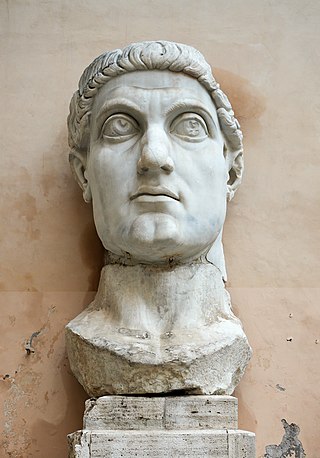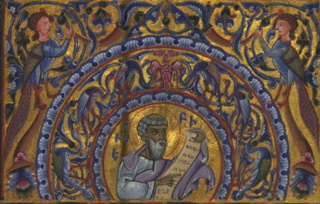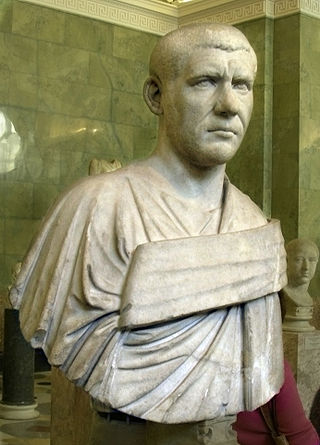Related Research Articles

Constantius II was Roman emperor from 337 to 361. His reign saw constant warfare on the borders against the Sasanian Empire and Germanic peoples, while internally the Roman Empire went through repeated civil wars, court intrigues, and usurpations. His religious policies inflamed domestic conflicts that would continue after his death.

Constantine I, also known as Constantine the Great, was Roman emperor from AD 306 to 337. He was the first emperor to convert to Christianity. Born in Naissus, Dacia Mediterranea, he was the son of Flavius Constantius, a Roman army officer of Illyrian origin who had been one of the four rulers of the Tetrarchy. His mother, Helena, was a Greek woman of low birth and a Christian. Later canonized as a saint, she is traditionally attributed with the conversion of her son. Constantine served with distinction under the Roman emperors Diocletian and Galerius. He began his career by campaigning in the eastern provinces before being recalled in the west to fight alongside his father in the province of Britannia. After his father's death in 306, Constantine was acclaimed as imperator by his army at Eboracum. He eventually emerged victorious in the civil wars against emperors Maxentius and Licinius to become the sole ruler of the Roman Empire by 324.

Eusebius of Caesarea, also known as Eusebius Pamphilus, was a Greek historian of Christianity, exegete, and Christian polemicist. In about AD 314 he became the bishop of Caesarea Maritima in the Roman province of Syria Palaestina. Together with Pamphilus, he was a scholar of the biblical canon and is regarded as one of the most learned Christians during late antiquity. He wrote Demonstrations of the Gospel, Preparations for the Gospel and On Discrepancies between the Gospels, studies of the biblical text. As "Father of Church History", he produced the Ecclesiastical History, On the Life of Pamphilus, the Chronicle and On the Martyrs. He also produced a biographical work on Constantine the Great, the first Christian Roman emperor, who was augustus between AD 306 and AD 337.
The First Council of Nicaea was a council of Christian bishops convened in the Bithynian city of Nicaea by the Roman Emperor Constantine I in AD 325.
Socrates of Constantinople, also known as Socrates Scholasticus, was a 5th-century Greek Christian church historian, a contemporary of Sozomen and Theodoret.
Quartodecimanism is the name given to the practice of celebrating the death of Christ on the day of Passover on the 14th of Nisan according to the biblical dating, being on whatever day of the week. The Quartodeciman controversy in the Church was over the question of celebrating Easter on the first day of the week, Sunday, or at the same time as the sacrifice of the Passover lamb.

Constantinian shift is used by some theologians and historians of antiquity to describe the political and theological changes that took place during the 4th-century under the leadership of Emperor Constantine the Great. Rodney Clapp claims that the shift or change started in the year 200. The term was popularized by the Mennonite theologian John H. Yoder. He claims that the change was not just freedom from persecution but an alliance between the State and the Church that led to a kind of Caesaropapism. The claim that there ever was a Constantinian shift has been disputed; Peter Leithart argues that there was a "brief, ambiguous 'Constantinian moment' in the fourth century", but that there was "no permanent, epochal 'Constantinian shift'".

Hosius of Corduba, also known as Osius or Ossius, was a bishop of Corduba and an important and prominent advocate for Homoousion Christianity in the Arian controversy that divided the early Christianity.

Lucian of Antioch, known as Lucian the Martyr, was a Christian presbyter, theologian and martyr. He was noted for both his scholarship and ascetic piety.
Antilegomena are written texts whose authenticity or value is disputed. Eusebius in his Church History used the term for those Christian scriptures that were "disputed", literally "spoken against", in Early Christianity before the closure of the New Testament canon.

Papal supremacy is the doctrine of the Catholic Church that the Pope, by reason of his office as Vicar of Christ, the visible source and foundation of the unity both of the bishops and of the whole company of the faithful, and as pastor of the entire Catholic Church, has full, supreme, and universal power over the whole church, a power which he can always exercise unhindered: that, in brief, "the Pope enjoys, by divine institution, supreme, full, immediate, and universal power in the care of souls."
The First Synod of Tyre or the Council of Tyre was a gathering of bishops called together by Emperor Constantine I for the primary purpose of evaluating charges brought against Athanasius, the Patriarch of Alexandria.
Caecilianus, or Caecilian, was archdeacon and then bishop of Carthage in 311 AD. His appointment as Bishop led to the Donatist Controversy of the Late Roman Empire. He was also one of only five Western bishops at the First Council of Nicea.
Helvidius was the author of a work written prior to 383 against the belief in the perpetual virginity of Mary. Helvidius maintained that the biblical mention of "sisters" and "brothers" of the Lord constitutes solid evidence that Mary had normal marital relations with Joseph and additional children after the miraculous conception and birth of Jesus. He supported his opinion by the writings of Tertullian and Victorinus. Helvidius is sometimes seen as an early proto-protestant, along with Vigiliantius, Jovinian and Aerius of Sebaste.
Saint Thraseas was a martyr under the reign of Emperor Marcus Aurelius. Prior to his death he served as Bishop of Eumenia, Phrygia, in Asia Minor.

This article chronicles the attested movements of the fourth-century Roman emperors Constantine II, Constantius II, Constans, Gallus, and Julian the Apostate from 337 to 361 AD. It does not cover the imperial usurpers of the period, including Magnentius, Vetranio, Claudius Silvanus, and Poemenius. The chronology is principally derived from Timothy Barnes' Athanasius and Constantius. Substantial additions and further sources are based on recent research that seeks to go beyond Barnes' own chronology and slightly modifying his at a few places.

Philip the Arab was one of the few 3rd-century Roman emperors sympathetic to Christians, although his relationship with Christianity is obscure and controversial. Philip was born in Auranitis, an Arab district east of the Sea of Galilee. The urban and Hellenized centers of the region were Christianized in the early years of the 3rd century via major Christian centers at Bosra and Edessa, but there is little evidence of Christian presence in the small villages of the region in this period, such as Philip's birthplace at Philippopolis. Philip served as praetorian prefect, commander of the Praetorian Guard, from 242; he was made emperor in 244. In 249, after a brief civil war, he was killed at the hands of his successor, Decius.
Blastus was a 2nd-century leader of the Roman Montanists, a presbyter in Rome and a Quartodeciman, however likely originally born in Alexandria. Blastus caused a schism in Rome about Easter and gained many followers. Some scholars have argued that the hostility of Pope Victor I against the Quartodecimans, was caused by Blastus' schism. Blastus argued that Christians must keep Easter at the same time commanded in the Book of Exodus. Blastus was accused of judaizing the Church by pseudo-Tertullian. Irenaeus wrote a letter to Blastus called "on Schism" which is no longer extant.
Florinus was a 2nd-century Roman presbyter, however later lost his office after teaching "heretical" doctrines, as he converted to Gnosticism or started to believe some Gnostic views in his later life. Florinus was mentioned by Irenaeus, and was apparently slightly older than him. Just like Irenaeus, Florinus was perhaps once a disciple of Polycarp, but he was later influenced by Valentinians. Eusebius claimed that Florinus taught dualism and that God is the author of evil, though most scholars accept Eusebius' statement, some scholars have suggested that Eusebius was mistaken on Florinus' view of dualism, Florinus also taught Monarchianism. Irenaeus wrote a work against Florinus and he was later excommunicated, likely by Pope Victor I.
Barbatinus was a 4th-century early Church theologian and a Jovinianist. Barbatianus disputed the merit of the unmarried life and opposed ascetism. Barbatianus along with Sarmatio met Jovinian when he travelled to Milan and found themselves to have similar ideas.
References
- 1 2 Eusebius (2019-06-01). Church History of Eusebius: ALL 10 Books in One Volume: The Early Christianity: From A.D. 1-324. e-artnow. ISBN 978-80-268-9774-3.
- ↑ "Henry Wace: Dictionary of Christian Biography and Literature to the End of the Sixth Century A.D., with an Account of the Principal Sects and Heresies. - Christian Classics Ethereal Library". www.ccel.org. Retrieved 2022-07-03.
- ↑ Schaff, Philip; Wace, Henry (2022-04-29). A Select Library of the Nicene and Post-Nicene Fathers of the Christian Church, Second Series, Volume 1: Eusebius: Church History, Life of Constantine the Great, and Oration in Praise of Constantine. Wipf and Stock Publishers. ISBN 978-1-6667-4021-9.
- ↑ Schaff, Philip; Eusebius (2019-06-01). History of the Christian Church & Ecclesiastical History: The Complete 8 Volume Edition of Schaff's Church History & The Eusebius' History of the Early Christianity. e-artnow. ISBN 978-80-268-9775-0.